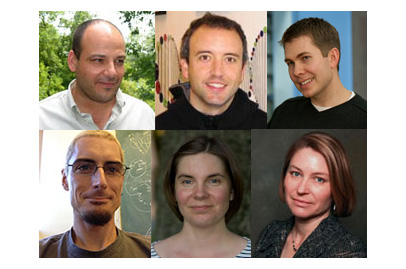G3 welcomes new Associate Editors Gustavo de los Campos, Christian Marshall, Chad Myers, Jeff Ross-Ibarra, Tanja Slotte, and Marilyn Warburton!
GUSTAVO DE LOS CAMPOS
University of Alabama at Birmingham
The academic interests of Gustavo de los Campos center on statistical learning methods with emphasis on applications in quantitative genetics. He completed two MS and a PhD degree at the University of Wisconsin-Madison, and postdoctoral training at the University of Alabama-Birmingham. De los Campos is currently Associate Professor in the of the Biostatistics department at University of Alabama-Birmingham. His current research focuses on the development of models and software for the analysis and prediction of complex traits and diseases using high-dimensional omic data. He has developed two statistical packages for analysis of complex traits and diseases using high-dimensional genotypes and pedigree (see BLR and BGLR) and authored a number of methodological and applied research articles on genomic analysis of complex human traits and diseases, as well as applications in plants and animals.
CHRISTIAN R. MARSHALL
The Hospital for Sick Children, Toronto, Canada
Christian Marshall completed his undergraduate and graduate training at Simon Fraser University in Vancouver, Canada. Following completion of his PhD in 2005, he undertook a postdoctoral fellowship at The Hospital for Sick Children in Toronto, Canada. His post-doctoral research focused copy number variation analysis for gene discovery in autism spectrum disorders. Marshall is currently an associate director in the Department of Pediatric Laboratory Medicine at The Hospital for Sick Children with a focus on developing and implementing new diagnostic tests using the latest in genomic sequencing technologies. His main research interests lie in using genome sequencing to identify structural variation underlying complex neurodevelopmental disorders.
CHAD L. MYERS
University of Minnesota
Chad Myers received his PhD from the Department of Computer Science and the Lewis-Sigler Institute for Integrative Genomics at Princeton University in 2007, working with Olga Troyanskaya. In 2008, he began his current position in the Department of Computer Science and Engineering at the University of Minnesota. Myers’ research emphasis includes computational methods for analysis and interpretation of large-scale genetic interaction networks and methods for integration of diverse genomic data. His lab is developing approaches for analyzing and leveraging interaction networks to answer biological questions in a variety of systems including yeast, plants, worm and human.
JEFFREY ROSS-IBARRA
University of California, Davis
Jeff Ross-Ibarra completed a BA and MS in Botany at the University of California, Riverside, followed by a PhD in Genetics at the University of Georgia and a postdoctoral stint at University of California, Irvine. Ross-Ibarra is currently an Associate Professor in the Department of Plant Sciences at UC Davis. His lab focuses on the evolutionary genetics of maize and teosinte, from studying patterns of transposable elements in natural populations of teosinte to selection on quantitative traits in modern maize inbreds.
TANJA SLOTTE
University of Stockholm, Stockholm, Sweden
Tanja Slotte is a population geneticist with broad interests in plant evolutionary genomics. She is especially interested in using genomic data and methods to study classic evolutionary transitions in plants, such as mating system shifts and polyploidy. In her research, she has used population genetics analyses to investigate the causes and consequences of these transitions, with a particular focus on the crucifer genus Capsella. The publication of the Capsella rubella reference genome represents one of her major recent research accomplishments.
Slotte received her PhD in Biology from Uppsala University in 2007, and completed two years of postdoctoral training at University of Toronto and York University, Canada, before moving back to Sweden for a position as Assistant Professor at Uppsala University. In April 2014, she took up a position with Stockholm University as an Associate Senior Lecturer and SciLifeLab Fellow in Ecological Genomics.
MARILYN WARBURTON
USDA-ARS Corn Host Plant Resistance Research Unit
Marilyn Warburton seeks to identify and use natural allelic diversity in maize to solve problems in biotic and abiotic stress resistance and nutritional quality. Warburton studied genetic diversity with Fred Bliss at the University of California, Davis and subsequent postdoctoral and sabbatical work at UCDavis, the University of Illinois, and Cornell University. At the International Maize and Wheat Improvement Center, she and colleagues measured genetic diversity in maize and wheat to study constraints to conservation and use of plant genetic resources, and document gene flow between crops and wild relatives. She also worked on identification of genetic sequences associated with provitamin A, which now allows breeders to improve maize nutrition via marker assisted selection. Currently, Warburton works in the Corn Host Plant Resistance Research Unit of the USDA, where she and colleagues work to identify and validate genetic sequences associated with resistance to the toxic fungus Aspergillus flavus.





































